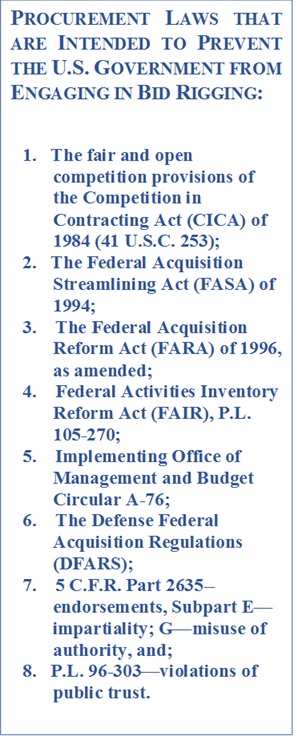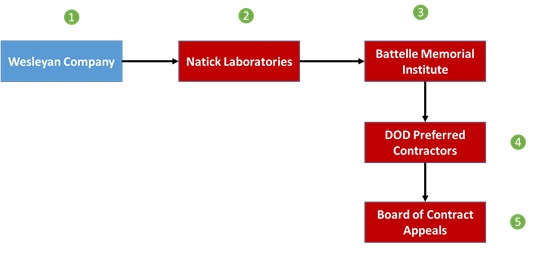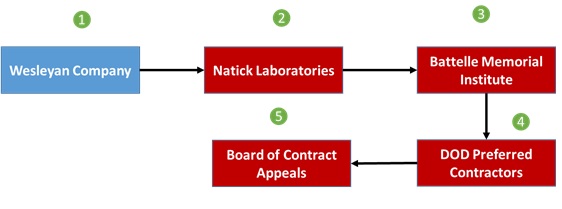 The Sherman Anti-Trust Act, outlaws monopolistic business practices. The Sherman Act declares that any actions “in the form of trust or otherwise that was in restraint of trade or commerce among the several states, or with foreign nations” is against the law. Persons engaging in anticompetitive conduct are subject to fines and possible incarceration. Individuals and companies suffering economic losses because of anticompetitive conduct can sue in Federal court for treble damages.
The Sherman Anti-Trust Act, outlaws monopolistic business practices. The Sherman Act declares that any actions “in the form of trust or otherwise that was in restraint of trade or commerce among the several states, or with foreign nations” is against the law. Persons engaging in anticompetitive conduct are subject to fines and possible incarceration. Individuals and companies suffering economic losses because of anticompetitive conduct can sue in Federal court for treble damages.
Undergirding all antitrust law in the United States is the fundamental principle that the Federal Government will serve as the honest broker by abiding by the principles of antitrust law and enforcing it as necessary to preserve open and fair competition in the marketplace.
Today, however, the expanding role of the Federal Government has grown to include the production of goods and services in direct competition with the private sector where the Federal Government has placed itself in the awkward position of engaging in anticompetitive conduct in collusion with groups of their own preferred contractors. Nowhere is this more evident than Federal Government agencies that exercise regulatory oversight over the different critical infrastructures of our society including energy, healthcare, pharmaceuticals, transportation, food and agricultural and others.
By way of example, let us consider a case involving the actions of the Department of Defense and a small business engaged in the design and building of protective gear for American soldiers.
In this example, the DOD misappropriated the patented ideas and trade secrets of the small company to duplicate their products in order to avoid paying royalties. The technology involved advanced hydration, i.e., drinking, systems for soldiers to protect them from nuclear, chemical and biological attacks on the battlefield. In this example, the U.S. Government and their ‘preferred’ contractors misappropriated the hydration systems technology worth hundreds of millions of dollars to avoid paying royalties of over $57,000,000 to the inventor and patent holder of the technology.
What Happened?
Figure 1: What Happened?
❶ The story begins when Wesley C. Schneider invented new drinking systems that allowed athletes and soldiers to drink water on the move. The mobility of sports enthusiasts and soldiers and their ability to remain hydrated is a critical aspect of their physical exertion. On the battlefield, there are other special considerations including how soldiers can safely drink in hostile nuclear, chemical and biological environments. What Mr. Schneider did was to invent and patent the on the move drinking systems that are now in wide use in both the military and the sports world.
❷ Mr. Schneider took his new patent to the U.S. Army at Natick Laboratories where he gave U.S. Government contracting authorities a proposal to build a new type of military hydration system for the warfighter that would protect them in the event of a nuclear, chemical and biological attack. Then U.S. Army officials simply misappropriated Mr. Schneider’s patented inventions and embarked on a scheme to duplicate the technology without having to pay any royalties to the inventor.
❸ U.S. Army officials then turned to their principal support contractor at Natick Laboratories, Battelle Memorial Institute (BMI), to use the hydration systems technology they stole from Mr. Schneider to duplicate Wesleyan’s products. BMI is one of the world’s largest non-profit scientific research and applied engineering organizations and serves as a technology clearinghouse for the U.S. Army at Natick Laboratories.
❹ In collusion with their contractor BMI, the U.S. Army then facilitated the broad diffusion of Wesleyan Company’s patented hydration systems technology to a group of their own DOD ‘preferred’ contractors including ILC Dover and Camelbak to duplicate. This served to transform Mr. Schneider’s sole ownership of his own patents into a generic enabling technology that could be used by the Department of Defense and other manufacturer’s free of charge.
❺ Mr. Schneider then filed a complaint with the Armed Services Board of Contract Appeals (ASBCA) in what turned out to be a nearly decade long battle with the Department of Defense. In 2009, in the face of conflicts of interest, U.S. Army counsel misconduct in suppressing critical evidence and egregious judicial error, the ASBCA finally ruled that the U.S. Army did nothing wrong.
❻ Meanwhile ‘preferred’ U.S. Army contractors like ILC Dover and Camelbak began to mass produce drinking systems that used Wesleyan Company’s hydration technology.
Bid Rigging by DOD, Battelle and Other DOD ‘preferred” Contractors
Figure 2: DOD, BMI and DOD ‘Preferred’ Contractors Engage in Bid Rigging
 ❶ Bid rigging is a form of fraud in which a commercial contract is promised to only one party. In the case of Wesleyan Company, the first predatory and anticompetitive conduct occurred when the U.S. Army saw a technology that they wanted—in this case the hydration system technology owned by Mr. Schneider. DOD desperately needed the technology in response to public and Congressional criticism about their slow response to protect the warfighter from the dangers of a battlefield attach using nuclear, chemical and biological weapons.
❶ Bid rigging is a form of fraud in which a commercial contract is promised to only one party. In the case of Wesleyan Company, the first predatory and anticompetitive conduct occurred when the U.S. Army saw a technology that they wanted—in this case the hydration system technology owned by Mr. Schneider. DOD desperately needed the technology in response to public and Congressional criticism about their slow response to protect the warfighter from the dangers of a battlefield attach using nuclear, chemical and biological weapons.
❷ The DOD (in this case Natick Laboratories) rather than following procurement laws to lawfully acquire the hydration systems technology by a sole source procurement with the Wesleyan Company simply misappropriated it. They faced the possibility of public embarrassment if they did not “come up with the “goods” because of their own promises to Congress to provide suitable protective gear for the U.S. soldier.
❸ BMI then colluded with their contract suitor, i.e., the DOD and the U.S. Army to bypass a huge body of federal procurement and procurement integrity law specifically designed to prevent the U.S. Government itself from violating the Sherman and Clayton Acts.
❹ In this example, U.S. Army officials and their contractor BMI, facilitated non-competitive “directed by-pass” contracts via Natick Laboratories to a group of pre-selected contractors, i.e., ILC Dover and Camelbak, to duplicate the Wesleyan Company hydration systems technology DOD and BMI originally misappropriated from Mr. Schneider.
❺ The Armed Services Board of Contract Appeals (ASBCA) by conflicts of interest, U.S. Army Counsel misconduct in suppressing key evidence in the case and judicial misconduct, by error or intent, served to further condone the U.S. Army’s authority to engage in bid rigging.
Price Fixing by DOD, BMI and Other DOD ‘Preferred’ Contractors
Figure 3: Price Fixing by DOD, BMI and Other ‘Preferred’ DOD Contractors
❶ Price fixing is an agreement between participants in the same market to buy, sell, or maintain the price of a product at an artificially fixed price. In the case of Wesleyan Company, the first step in fixing the price of the Wesleyan hydration systems technology took the form of collusion between DOD and their support contractor, BMI, to avoid procurement laws that preclude the U.S. Government from engaging in bid rigging or price fixing.
❷ Step two consisted of DOD and BMI collusion to misappropriate Wesleyan Company-owned hydration system technology and let unlawful non-competitive contracts to DOD’s preferred contractors, i.e., ILC Dover and Camelbak to duplicate the technology at $0 royalty cost to the Army. Both ILC Dover and Camelbak were paid under U.S. Government contracts to use the misappropriated hydration systems technology to duplicate Wesleyan’s products.
❸ Soon thereafter, DOD attempted to obtain a bogus patent in an ill-fated attempt to obfuscate the true ownership of the Wesleyan Company-owned hydration system technology. The result of this DOD, BMI, ILC Dover and Camelbak collusion served to fix the price of the new hydration system technology at $0 royalty cost to DOD. It also served to transform the originally patented hydration system technology owned by Mr. Schneider into a $0 cost generic enabling technology solution for use in both military and recreation applications. Finally, it served the best interests of the ‘preferred’ contractors to maintain their positions for consideration for future DOD contracts.
❹ BMI and other DOD contractors, seeking to expand their own competitive foothold in the burgeoning multi-million dollar market for military and recreational uses of hydration systems technology, colluded with DOD and BMI to duplicate Wesleyan Company’s patented technology. In this case, DOD and the U.S. Army were “directing” non-competitive contracts to duplicate Mr. Schneider’s technology to produce at artificially low cost a hydration system solution for use by DOD, the U.S. Army and the other military services.
❺ The April 2009, ruling by the Armed Services Board of Contract Appeals (ASBCA) by conflicts of interest, U.S. Army Counsel misconduct in suppressing key evidence in the case and judicial misconduct, by error or intent, served to fix the price of hydration systems technology at an artificially low price.
Harm to the Consumer
It would be easy to mistakenly conclude that the actions of the DOD, BMI and other DOD contractors are not that significant. After all, the fact that low-cost hydration systems technology to protect the warfighter can only be good for our national security and the safety of our soldiers. Right?
Well, unfortunately the answer is not as simple as that. Innovation by small companies is at the heart of practical solutions. For every problem we solve today there are nothing but equally vexing problems to solve tomorrow. An economic system that rewards entrepreneurs for their creativity in solving new problems is at the heart of our national security.
The government has a poor track record of innovation. In our system we rely on entrepreneurs to do this heavy lifting for the government. By their predatory and anticompetitive actions DOD, BMI and other ‘preferred’ DOD contractors are compromising our ability to find the innovative solutions we are surely going to need to solve the next intractable problems that threaten our national security. Government misappropriation of technology from entrepreneurs only serves to stifle innovation by eliminating the rewards system that stimulates problem solving. In the end, the American people rely on this rewards system to keep the nation safe.
The entire story of Wesleyan company and the constructive notice served to Secretary of Defense Carter can be found at the John Galt Program for Investigative studies website at https://jgpis.org




